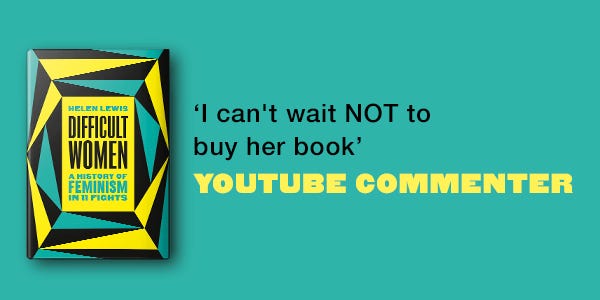Happy Friday!
Earlier this week, Bluestocking reader Chris chastised me for saying in the last newsletter that it felt as though things were getting back to normal. He was correct to do so; my solemn vow not to have any uninformed opinions on the R0 rate is henceforth reinstated.
This week, I have been reading Patrick Maguire and Gabriel Pogrund’s Left Out, which covers the Corbyn project from the high of 2017’s hung parliament to the low of 2019’s electoral disaster. The book strives to be fair to everyone involved, though it reads to me as though the Seumas Milne/James Schneider axis co-operated less than the Karie Murphy/Andrew Fisher one, and so we see events more from the latter’s POV. As Donald Trump is now discovering, giving interviews to political chroniclers is a fine calculation: is it worth the risk of your mistakes getting airtime to put your side of the story across?
As anyone who covered Labour from 2015 onwards will already know, the levels of backstabbing, bitching and in-fighting are off the hook. Almost no one comes out well, whether you sympathise with their aims or not. The Corbynsceptics, in this telling, played very dirty. The Corbynites were little better.
The book leaves you wanting to understand Keir Starmer better. Here, he is an enigma who operates by dropping policy bombs (such as going on Marr and advocating for a Remain option in a second referendum) without briefing against anyone. I suspect Starmer might be that most horrifying of figures: someone who just gets on with stuff without monologuing like a Bond villain. Someone who doesn’t need to tell you how clever they are while doing something clever is a political journalist’s nightmare. Tactical boringness is a great weapon.

My longterm problematic fave John McDonnell also emerges with some credit, as a man who really, really wants to get into power and can’t understand why the leadership would do petty and self-defeating things (like getting into a legal battle with Margaret Hodge over anti-semitism) which make that harder.
The black hole at the centre of this narrative is Corbyn. Unlike Starmer, he doesn’t seem tactically boring. He just comes across as stubborn, irritable and incapable of the necessary ruthlessness for leadership or even making basic decisions. He won’t sack people. He can’t decide whether to defenestrate Tom Watson or not. He becomes incredibly, unhelpfully defensive when accused of anti-semitism, seeing it as an attack on his very soul, and so cannot bring himself to apologise on the occasions where he clearly got it wrong (the mural, “English irony”). Finally, he seems overwhelmed by the task of leadership, made miserable by its demands. You suspect he was secretly relieved to lose the election.
The swift marginalisation of those close to Corbyn since April is almost as astonishing as his original rise to power. (That said, Corbynism isn’t dead yet: watch what happens with the trade union top jobs.) Pogrund and Maguire refer constantly to “The Project”, and in their telling, The Project’s two biggest failures were the inability to agree a Brexit position - you suspect that even a bad position would have been better than paralysis - and the inability to find an heir. (Even then, John McDonnell deserves credit, having spent years grooming Rebecca Long-Bailey; he reasoned that the party would decide it was time for a woman. LOL.)
Left Out made me more sympathetic to The Project over the horrorshow of the 2019 election. I suspect there was nothing to be said on Brexit which would have prevented their electoral coalition from splitting: socially liberal graduate Remainers in Zone 2 and working class social conservatives in the Don Valley were impossible to reconcile. And people were tired of Brexit. That’s why it feels dangerous for Boris Johnson to revive the issue by trying to rewrite the Withdrawal Agreement. It’s a road which leads to No Deal, which is not only not what he promised in his manifesto, but an outcome with material consequences. No Deal would ensure that Brexit impinges on people’s lives in the form of higher food prices and irritating paperwork. Sorry, didn’t you promise to get that done?
Anyway, can’t believe I’ve spent so many paragraphs plugging a book that isn’t mine, and is selling like (oven-ready) hot cakes without my help. Disgusting.
Helen

PS. Weird request. I’m currently looking into a specific kind of internet deception: people who assume marginalised identities (eg pretending to be the descendant of Holocaust survivors, or the victim of a hate crime). Any examples gratefully received. One arresting story: the woman who became the head of the 9/11 survivors foundation . . . was not a 9/11 survivor. (Well, I guess she did survive 9/11, but only by being in Barcelona.)

The Mortifying Ordeal of Being Interesting (Lithium)
Now, my own desperation to be interesting could stem from overarching feelings of inadequacy or maybe the fear of being unimportant in the great cosmic scheme of things or god forbid (even though we know this is the hard hitter) that sliver of satisfaction that comes with the deeply misogynistic phrase “you’re not like other girls.” I’ve come to realize that interesting implies an abundance of something as a quick remedy for a scarcity somewhere else. I’m ten times funnier than I’ll ever be pretty and I’m a hundred times more intelligent than I’ll ever be happy. I’m not sad, I’m well-rounded.
I stole this from Caroline Crampton’s excellent newsletter, No Complaints.
Second Chances (NYRB)
I had unapologetically, almost unthinkingly, used a literary device in In the Freud Archives that was commonplace at The New Yorker but that outside journalists—in the accusatory atmosphere following the Lipman article—saw as another violation of the reader’s good faith. The device was the uninterrupted monologue in which characters made preposterously long speeches in impossibly good English. Anyone could see that the speech had never taken place as such but was a compilation of what the character had said to the reporter over a period of time. Not everyone liked the convention, but no one thought it was deceptive, since its artificiality was so blatant.
Argh I love Janet Malcolm’s writing so much but this is MENTAL. You can’t smush quotations together like this! Anyway, the timing of this piece suggests to me that it might be an allegory of everything the press got wrong in covering Donald Trump in 2016 - “I came across as arrogant, truculent, and incompetent” - and how they have a chance to redeem themselves now.
Data Theatre (Martin Robbins, Substack)
The government’s problem isn’t that it lacks information (although more reliable figures on a range of metrics would obviously help), it’s that it struggles to build a robust understanding of the situation from the information it has, that can form the basis for coherent, consistent policy. Each day brings some new finding - on COVID science, on public opinion, the level of anger among its back-benchers - that completely upends the previous model and sends them scrambling to change course, as if physicists had to frantically rewrite the entire laws of the universe upon the discovery of each new particle.
This sounds exactly right to me. The government is very self-satisfied about its continual polling and focus-grouping, but there’s a problem. People are really fickle, they often don’t know what they want, and they sometimes lie about it, too. They’re also terrible at telling you what they’ll think next week. Metrics can become a prison. They look objective but really aren’t. And you end up trying to give people more of what they want, without asking if that’s the right thing to do. Just ask journalism.

Quick Links
The Sopranos OH! megamix. Hat-tip to Tom Sutcliffe.
“In the shade of an expansive oak, six headstones mark the graves of Katharine and Andy White, Roger’s brother Joel White, his daughters Callie and Alice Angell, and his wife of forty-eight years, Carol Rogge Angell (1938-2012). Next to Carol’s is an identical seventh, a slender marble slab engraved with his own name and birth year, standing by.” (New Yorker)

I’m offering some journalism mentoring via Zoom. Register your interest here.



https://www.newyorker.com/culture/cultural-comment/the-layered-deceptions-of-jessica-krug-the-black-studies-professor-who-hid-that-she-is-white
Hi Helen, I'm sure you've probably heard the woman who faked being a Bataclan survivor: https://www.bbc.co.uk/news/world-europe-45875004